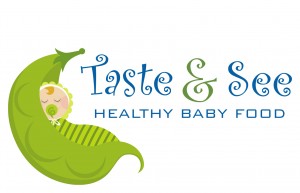Meet Cheryl Carey, MSW. She is the founder of Taste & See Healthy Baby Food, an organization that offers tips, recipes, instructional classes and hands-on cooking workshops to parents who want more guidance on feeding their growing babies. Cheryl has a Master’s degree in social work from Texas State University and worked for more than 20 years with families and caregivers in various roles at the Texas Department of Protective Services. After giving birth to her son, Caleb, and navigating the many decisions and challenges involved in feeding a baby, Cheryl developed a new interest in early childhood nutrition. She decided to combine her passion for helping families with her love of cooking into helpful resources for parents. Introducing solids and navigating the world of baby and toddler food can be overwhelming – we wanted to learn more about the information and services that Cheryl provides to new parents.
BPP: Would you share the mission of Taste & See Healthy Baby Food?
CC: Taste & See Healthy Baby Food supports parents in creating a happy and healthy home environment in which a child can truly grow and thrive. Research indicates that establishing a nutritious diet and healthy eating habits for a child will reduce the risk of illnesses and obesity, both in childhood and adult life. I offer instructional cooking classes, free talks and other resources regarding food preparation and safety. Parents can access nutrition information, advice on feeding their child (from weaning to preschool) and recipes, all designed to help them prepare delicious homemade meals for their babies.
BPP: How did you decide to launch Taste & See?
CC: I founded my business in January 2011 after my sister-in-law, Mercedes, and I shared the experience of raising our sons together. They were born less than two days apart! We shared in the journey of learning about healthy & safe foods that we could offer our sons. I saw the benefit of having someone accompanying me on that adventure and launched Taste & See as a result.
BPP: How did your own experiences with feeding your baby impact your role as a child-nutrition educator?
CC: As a first-time parent, I found myself with more questions than answers about when and how to introduce solid food to my son. It was overwhelming. I turned to my family, friends, books, and on-line resources for answers, but found that just as I finally knew what to do for Caleb, he was moving on to the next phase! My search for answers took up precious time that I could have spent with my son as an infant. The upside was that I learned so much about the variety of food available to my family as I expanded the foods I offered to my son during the different stages.
Throughout this experience, I thought about how parents could really benefit from a resource designed to educate them about introducing healthy, fresh and homemade food EARLY in the process, rather than as they went along. I decided to create a program that offers recipes and invaluable information about nutrition and feeding. In addition, the services include food demonstrations and hands-on workshops for parents who are beginners in the kitchen and are ready to learn basic cooking skills. Honestly, I wish this guidance was available to me during my son’s first year!
BPP: What are the most common concerns you hear from new parents about feeding their little ones?
CC: 1) Knowing if their baby is ready to start solid food, 2) Difficulty navigating the food guidelines for introducing foods, and 3) Wondering if their baby is getting enough food. Parents feel overwhelmed by either the lack of information or the overwhelming surplus of information about introducing solids to infants. They have to make important decisions about whether to use commercial baby food or to prepare their own. Some parents have minimal support and information.
Taste & See Healthy Baby Food alleviates the concerns of many parents and offers guidance on introducing foods from weaning to preschool. Preparing homemade foods should not be scary or difficult. Instead, the experience of introducing foods to a baby should be fun and exciting!
BPP: When do you recommend parents begin to take your classes?
CC: I recommend that parents participate in an instructional class or schedule an in-home workshop when their baby is 5 months and older. This is based on the American Academy of Pediatrics (AAP) recommendation on when to start solid foods with your baby. There is a 4-week supply of baby food prepared during the hands-on in-home workshop — the food made can remain in the freezer for 30 days (or up to 3 months). Parents can have a freezer full of food prepared for when their baby is ready to start solids! Taste & See Healthy Baby Food offers information about nutrition and feeding from weaning to preschool.
BPP: How do you structure your classes? Is it like a traditional cooking class? Do the parents get hands-on experience?
CC: Taste & See offers two instructional one-hour classes – Homemade Baby Food 101: Fresh & Simple! (0-12 months) and Finger Foods & Lunch Box Ideas (12 months and older). The classes are comprehensive and discuss child development, basic cooking skills, age-appropriate food guidelines, nutritional recipes and more. The classes include comparisons of store bought and homemade baby food, food tastings and a demonstration for consistency and texture of foods. The classes offer food suggestions for parents using the puree method and the baby-led weaning method. In addition, there are classes on special topics offered throughout the year.
Taste & See Healthy Baby Food offers three hands-on workshops in the convenience of the parents’ kitchen. The hands-on workshops are divided up based on food stages – New Taste & Textures (4-8 months), Beyond Purees (8-12 months) and Super Eaters (12 months and older). The puree method is used to prepare homemade baby food during the workshops.
The information shared during the classes and hands-on workshops give parents a foundation of information to build on for their family’s health and well-being. Parents can also participate in seasonal classes at the farmers market to learn about fresh produce that can be used to prepare homemade foods for their child and their family. The services provided are personalized to meet the needs of each family.
BPP: What are the benefits of the hands-on workshops in the home?
Of all the services provided by Taste & See Healthy Baby Food, my personal favorite is the hands-on workshops. Parents have the option to schedule a private or a group workshop in the comfort of their own home. These workshops are a fun, unique and affordable way to enjoy the company of friends and family at any cooking skills level – beginner, intermediate, or accomplished chefs. They consist of a 2 ½ hour lesson with instruction and the hands-on preparation of a four-week supply of homemade baby food. There are a variety of workshop options: private, couples, moms groups. Parents can have fun in the kitchen while they prepare healthy and homemade foods for their children.
BPP: You are a Master-degreed social worker with over 20 years of experience working with families and caregivers within Texas Department of Protective Services. How does this experience impact how you work with parents and build partnerships in the community?
CC: I am clearly passionate and committed to the safety, protection and well-being of children. My experience with my son’s introduction to food from the time he was an infant to preschool expanded my commitment to include early childhood nutrition. I believe that the healthy food choices we make for our babies lead to healthier food choices for our family’s future. Our family’s health depends on good nutrition.
BPP: Do you often see food allergies and/or sensitivities in the families you serve? How do you accommodate for these?
CC: Taste & See Healthy Baby Food educates families about food allergies and food intolerances. We consider a variety of factors, including when to introduce allergenic foods and family history of food allergies and sensitivities. In addition, the parents are taught the 4-day rule to watch for potential food reactions. If parents know their baby is at risk for significant food allergy, they are directed to their pediatrician for medical evaluation and treatment.
BPP: How do parents feel that they benefit from taking a class or scheduling an in-home workshop?
Parents feel empowered by the information about nutrition, food preparation, recipes and tips they get during classes and workshops. Instead of feeling fearful and uncertain about introducing foods, they feel informed and excited about preparing homemade foods. Parents feel confident that they can provide the healthiest start to their little one.
BPP: If you had to give one sanity-saving tip to new parents, what would it be?
Have fun and make memories. Relax! Food in the first year complements either breast- or bottle-feeding for your baby. If parents have unrealistic expectations when introducing foods to their little one it can create a very stressful experience. Keep these things in mind: (1) There is no rush in starting to introduce foods. (2) If a baby does not like a food you offer then wait a few days or weeks and try again. (3) It’s going to be a messy experience. Babies and toddlers explore food with their hands and learn about taste and textures when they eat. It’s up to parents to remain calm and to support their child’s learning experience. Let it be a fun experience in which you bond with your child. Capture the funny faces and the big messes by taking pictures and videos so the memories will be forever remembered.
Thank you Cheryl for sharing about this incredible resource available to new parents! As we always say, we really wish we knew you when we had newborns. C & K ♥
If you want to learn more about Cheryl’s classes, workshops, recipes or food tips, check out her website at: http://tasteseebabyfood.com/
You can also follow Taste & See Healthy Baby Food on Facebook at: https://www.facebook.com/tasteandseehealthybabyfood






